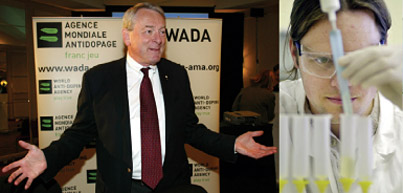In the News (Page 2)

Pound at a WADA press conference. Urine testing has continued since Athens, and several more athletes have been stripped of medals.
CPimages.ca
What are out-of-competition tests, and what is their importance?
The real danger in doping doesn't occur on race day; the so-called "race day drugs" are stimulants. The real risk is during the training period, and that's why we have out-of-competition tests. People disappear for two to four weeks, and we don't know where they are. That's probably when they're taking growth hormones, anabolic steroids or (red blood cell booster) EPO.
So every athlete must be subject to "no-notice" testing, seven days a week, 24 hours a day, 365 days a year. And they must provide information on their whereabouts at any time. If an athlete says he's training in Montreal and we come to test him and find out he's really in Bogota, that can count as a missed test or a refusal to be tested.
Were these Olympics the "best ever," from the point of view of testing?
There were certainly more tests done at the Athens games than ever before, and more positive cases found. Also, one of the impacts of the work we've been doing is that a lot of people who might otherwise have gone to Athens stayed home. Either they were caught by their own national authorities, or they suddenly remembered that they left the iron on so they couldn't go.
Do you foresee a completely clean Olympics?
For me, a completely clean Olympics would be having 99.9% of the athletes not doping, and being able to assure them that the rogue one-tenth of 1% will be caught. But human nature is human nature, and there will always be some out there who don't think the rules should apply to them, or know the rules apply to them but don't give a damn. In our role at WADA, we have to assume there will be people like that, and we have to be ready.
Do some athletes believe they have to engage in doping because the "other guy" is?
There will always be somebody who will rationalize their own misconduct, who will say, "I have to level the playing field, because the guys in suits can't do it for me." That's the excuse that's often used. There was probably a time, at the height of the Cold War, when athletes on this side of the Atlantic were not subjected to government-imposed doping programs but they knew they were competing against athletes who were. And authorities didn't try too hard to catch them. That's not the case today.
Athletes are sometimes penalized for taking things like cold medications. Is that fair?
First, let me say that doping in sport is very seldom accidental. You may get the odd athlete taking a cold pill or nutritional supplement without some intention of doping, but that's rare. In the future, we have to find ways to make sure the athletes are not the only ones who pay the price. The Athletes' Commission of the IOC has an interesting suggestion: when you're called up to give a doping test and you fill out the form, you should put in not only your name but the name of your coach and your doctor. If you test positive, it's on all three of you.
In Sydney, a Romanian gymnast was given a cold pill with a stimulant in it by her doctor. She tested positive after winning the all-around gymnastics title. She was stripped of the one medal in the event for which she tested positive, because she may have benefited from the stimulant. She kept her other medals, but we kicked the Romanian doctor out for five years.
There is a perception that medal winners are the ones who haven't been caught yet. Is there some truth to that, or is it extreme cynicism?
That's pretty extreme. We do tests year in and year out, advance notice, no advance notice, in and out of competition, and about 1% test positive. Even if you double that, assuming that there are as many that we don't catch, we still have 98% who don't cheat. I would prefer if 99.9% competed clean, but cheating is not the norm.
The only time you should be really suspicious is when someone comes from nowhere to become Olympic champion. Most athletes have been around for years, and people have been able to watch their progress over that time. Someone who comes out of nowhere will be tested far more often than anyone else.
Is there too much pressure on Olympic athletes to win medals or set world records?
I don't think so. Don't forget, the athletes have put themselves in this position of high pressure. They want to go and be measured and they understand there is a risk that they won't be the world or Olympic champion. That's part of the fun, the excitement, the terror of sport.
Dick Pound was interviewed by Montreal writer Sylvain Comeau. For more about WADA, visit the agency's website at www.wada-ama.org.


